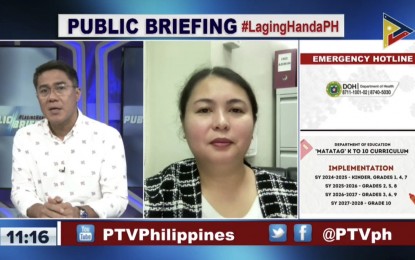
HUMAN TRAFFICKING. Bureau of Immigration spokesperson Dana Sandoval (right) warns against illegal recruiters who are targeting Filipinos intending to work overseas, luring them to abusive schemes, in an interview during the Laging Handa public briefing on Thursday (Aug. 24, 2023). Sandoval said such offense is non-bailable, punishable by life imprisonment. (Screengrab)
MANILA – The Bureau of Immigration (BI) on Thursday assured regular tourists it will not require more travel documents despite its intensified campaign against human trafficking.
During the Laging Handa public briefing, BI spokesperson Dana Sandoval said immigration officers will just focus on the purpose of travel of passengers to filter out those with inconsistencies.
"For regular tourists, wala namang kailangang ikabahala, walang additional na documentation (no need to worry, there's no additional documentation)," she said.
Sandoval made the statement after the Inter-Agency Council Against Trafficking (IACAT) announced the revised guidelines for departing Filipinos, which is set to be implemented on Sept. 3.
"In essence, it's really more of streamlining the requirements for departing Filipinos and para malinaw din sa ating mga kababayan kung ano po 'yung kinakailangan for each category ng mga umaalis po sa ating bansa (to clarify to our fellow Filipinos the requirements per category needed for departure in the country)," she added.
Sandoval said the bureau is not requiring unnecessary documents such as diplomas, certificates and togas.
"Ang tinitingnan talaga natin is the purpose of travel. If the purpose of travel is in connection sa dokumento na pinapakita nila, wala pong problema. Even for first-time travelers, hindi po necessary na mas mahigpit tayo (What we are looking at is the purpose of travel. If the purpose of travel is in connection with the presented documents, there's no problem. Even for first-time travelers, it is not necessary that we will be stricter)," she said.
The BI cited basic immigration requirements for travelers such as identification cards, passports, confirmed round-trip tickets and visa if applicable, alongside proof of monetary capacity, and/or local employment as sources to sustain their travel abroad.
"Ang tinitingnan po nung ating mga immigration officers is 'yung ties niya sa Pilipinas... and if legitimate 'yung kanyang travel (The immigration officers are looking into the traveler's ties in the Philippines and if the travel is legitimate) by looking at the purpose of travel, also the financial capacity of the person," Sandoval said.
Meanwhile, the revised IACAT guidelines indicate the need to secure an affidavit of support and guarantee notarized by the Philippine consulate for overseas travels sponsored by relatives or non-relatives; clearance from the Department of Migrant Workers for first-time OFWs (overseas Filipino workers); and a travel clearance certificate from the Department of Social Welfare and Development for minors traveling without parents.
The BI called on aspiring OFWs to not entertain trafficking syndicates, instructing them to pretend as tourists, only to end up in abusive working setups abroad.
"It's not just the prostitution ring, it's also 'yung mga (the) pseudo-call centers, mga crypto scams and other illegal work po. Araw-araw po natin itong nakikita sa ating mga paliparan (We are seeing it every day in our airports)," Sandoval said.
She also warned illegal recruiters to stop such schemes, noting the intensified interagency campaign against human trafficking.
"This is a non-bailable offense. Kung di po ako nagkakamali (if I'm not mistaken) maximum 'yan 40 years in prison. I hope this serves as a warning," Sandoval added.
Under the Anti-Trafficking in Persons Act, a qualified trafficker shall face life imprisonment with a fine of at least PHP2 million and not exceeding PHP5 million. (PNA)
